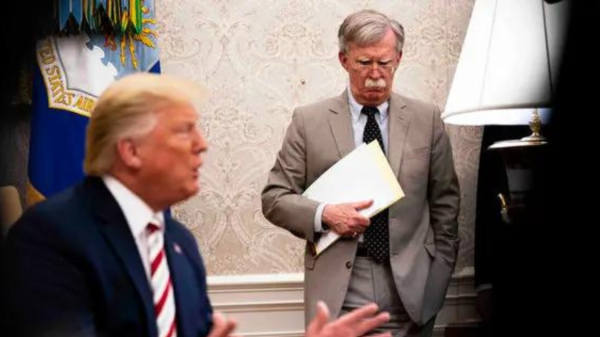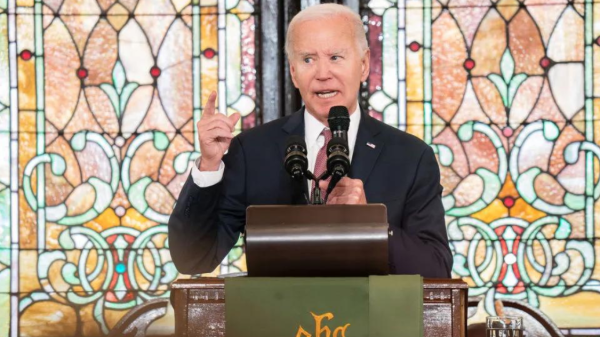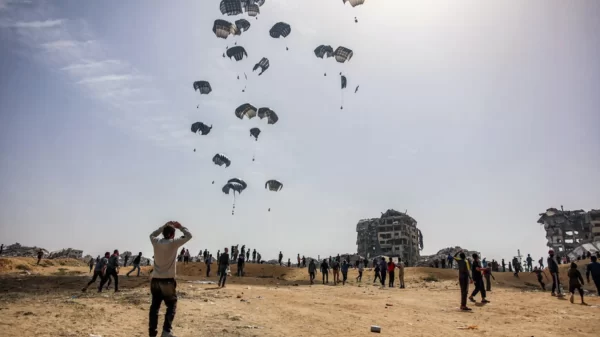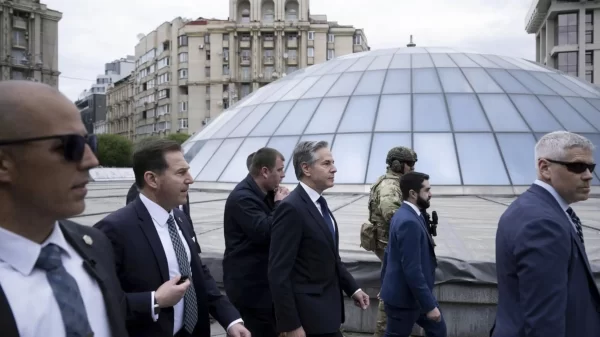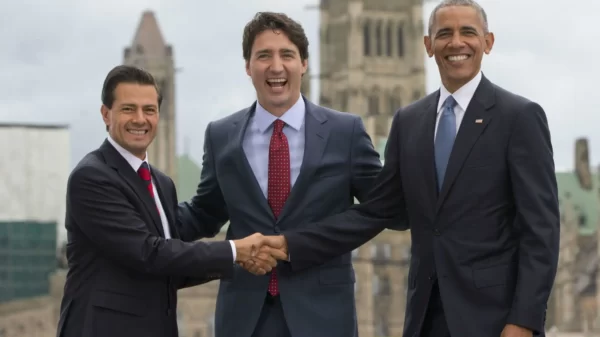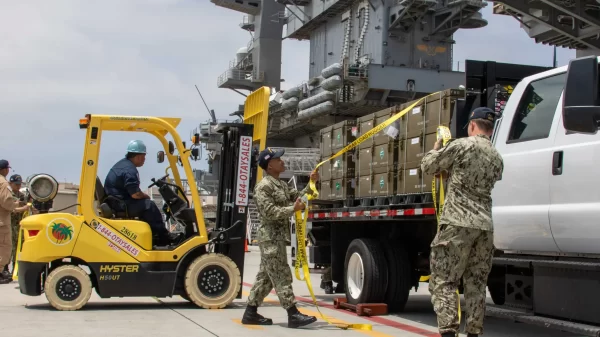Sanctions are acts of modern barbarism, employed and in disguise as diplomatic innovations that help nations to avoid armed conflict. The idea is simply that pressuring nations, their societies, and their irreconcilable leaders with economic and diplomatic restrictions will ultimately cause the target of these sanctions to yield and partake in reasonable, rational, and emotionally detached diplomacy, eventually.
This was all conceived as an alternative to explicitly physical confrontations, and is certainly not a new innovation in the greater historical sense. The usage of sanctions in the 20th and 21st centuries, however, has grown, as have the numbers of people affected and afflicted by these proclamations; it is all startling, as well as diplomatically and intellectually stifling. With the carnage and horrors of the First World War, a concerted effort was made by the international powers of the time to think of an effective, meaningful, yet civilized alternative to conventional war, with the League of Nations being a theoretically integral part of this effort, that might act as an actual deterrent to the bloodshed and barbarism nonetheless; hoping to also move beyond blockades, like those famously imposed by the United Kingdom during World War I, that had starved and wasted so many peoples, cities and now societies throughout human history, the sanction began to be reimagined in the various modern ways that we are familiar with today.
While the League would do its best to work towards positive, international ends, a number of factors, including the lack of American participation, would doom its mission to preserve peace across the globe during the interim between the two major conflicts of the 20th century. Although sanctions were both imagined and utilized across the first half of the 1900s, the practice of sanctioning has gained greater popularity in the years since the end of the Second World War, particularly in the last two to three decades, and especially from the United States; yet, ironically, the products of these pseudo-diplomatic maneuvers are many of the same horrors that have been created before from blockades, sieges, and warfare across human history itself. The modern results of this increasingly American behavior can be witnessed across the modern world, and includes as its victims many of the poorest and greatest suffering nations and populations on Earth today; far from creating a more harmonious world without conflict, sanctions have kept countless leaders in their tenures for years on end, changed little behaviorally over those time periods, and punished so many societies for the predilections and prevarications of their own captors.
When the world and the reality of things are understood and properly appraised in these ways, much of the humanitarian pretense behind sanctioning falls to pieces rather quickly. How can what actually happens to nations under the burden of sanctions, be reconciled with what is supposed to, eventually, positively occur thanks to them? How can it be said that this international means of punishment, of which, on its best days, almost has to be done with near international unanimity from the most powerful and influential nations of each continent to create the desired effect, works at all, humanely or otherwise, when, in the form it has primarily taken for the last seven to eight decades, all it has primarily accomplished is the suffering and death of countless millions of lives? Appraised with these questions in mind, in other words, the use of sanctions is not obviously successful, humanitarian, or even ultimately non-violent.
This recourse, utilized today as an answer in itself instead of a tool towards actual progress or further diplomatic exercises, has caused real harm for innocent people around the world and has helped to sour international opinion of the United States in the process. This has hurt the people of the world as well as the people of America, and only when an internationally cooperative solution can be found might the healing process really begin in earnest; while the time period since the Second World War has been divided and labeled so many different names, including famously the era of the Cold War, it is possible to divine a still more graphic and vivid interpretation of the character of this time period.
It is difficult, nigh impossible, to expect or think that any era of human existence has the absolute self-awareness of itself that is required to fully comprehend what human time period or era they find themselves in. This is to say, that those individuals in the “Neolithic” Age, knew no more that they were in this time period of human development, coined by the Englishman Sir John Lubbock in 1865, than some of their successor’s thousands of years later would understand themselves to be living in Petrarch’s “Dark” Age, Leonardo Bruni’s “Middle” Age, Adam Smith’s “Feudal” Era, first mentioned in his famous book “The Wealth of Nations” in 1776, or even the “Renaissance,” made most popular by the famous 19th-century French historian Jules Michelet; all were concretely given their titles by posterity, and, no matter how subjective they might be, they have all have stuck in the years since, for the most part.
These titles are, almost always, handed down by the successors, by those who came afterward and, looking back, both with and without bias, could perhaps appraise the circumstances of those time periods with a different breadth of understanding than those who lived those days intimately. This is not to say that generations or time periods do not attempt to label, define or describe themselves as they are still happening and evolving, as it is quite historically and practically plain that they do and have. It is simply to say that, when all of which those loosely defined eras are made up of can be appraised and analyzed, those observations, analyses, and labels of future generations are often what sticks in our minds as the years compound and existence continues. With this understood, I myself posit that the post-World War II international landscape and story, when properly appraised in the decades of centuries to come, will be understood from the perspective of international relations and the like at least, rather sardonically, as “The Great Era of Sanction Diplomacy.”
“The Great Era of Sanction Diplomacy”, and how it is stifling a broader human appreciation, comprehension, and compassion of and for one another
Apart from the scale of the torment and depravity, however, there is little very good or great, in the literal sense, about them in principle, practice, or produced effect; my name for the era may not stick, but the notion, I believe, will. Sanctions generally create, for the targeting nations, a relentless, unending blanket of domestic pressure unlike any modern-day or historical strategies or weapons I’m familiar with; blockades, until rather recently in historical times, could not usually suffocate entire states or nations. For this targeted nation on the other hand, what we might call the “siege effect” on a grand scale, in a phantasmal, metaphysical sort of way, is produced by these sanctions instead.
There is no physical siege or blockade at all of course, as have been famously documented and witnessed across time and human history, from the Sieges of Syracuse, Calais, or famously Constantinople, to the British blockades of the United States during the American War of Independence, those of the Napoleonic Wars, that blockade of Venezuela in the early 20th century, or the aforementioned blockade of Germany and the other Central Powers during WWI. These tactics cost money in the form of paychecks and resources, oftentimes lives too, as well as public opinion, time, and energy that the most advanced or powerful modern nations often do not feel they can be bothered to waste over every argument or disagreement. However, instead of working on these problems through open dialogue regarding practical or economic disagreements, cultural or social differences, and the historical barriers that often separate humans from one another, a nation like the United States, for example, can simply choose to diplomatically and economically damage, and even sometimes, in these same ways, excommunicate nations from the greater international community.
To put it bluntly, this is simply an ineffective strategy to use for any nation or nations with the ambition of persuading nations towards cooperation, innovation, or reconciliation; when a trade embargo and asset freeze and seizure, effectively sanctions, were collectively levied upon the Japanese by the Roosevelt Administration in July 1941, far from bringing Japan to the bargaining table, it set them on a course that would lead them to the attack of Hawaii at Pearl Harbor on December 7, 1941. This type of pressure simply does not typically produce behavioral or regime change, and where regime change has occurred, it has certainly not ever really been successful, in practice, in creating positive, fluid circumstances for any of the involved nations to mutually develop and grow together in the aftermath. This is because, while these sanctions ultimately achieve their goal of expounding a sort of total societal, “Maximum Pressure” on a nation, they fail in the mission of expounding so much pressure across an entire society so as to make them crumble, generally speaking; they hobble, impoverish, sicken, infuriate and attempt to diminish them, sometimes for decades upon decades on end, but while decimating societies and peoples, sanctions very rarely decapitate regimes.
As noted just previously, modern-day sanctions strain not only singular cities and their often blameless populations, as was traditionally seen from both the aforementioned sieges of Syracuse and Constantinople, but entire nations, as well as their most common people, for as long as the powerful nation or nations feels it remains reasonable and responsible for the exercise to continue. While the siege of old might have trapped the powerful in their cities with their people, even the singularly targeted sanctions of today are avoidable, and indeed, regularly avoided through various means, including financial manipulation and private third parties.
Furthermore, as can be practically witnessed as easily in modern times as in recent history, America, like the powerful nations of human history before it, does not produce punishment, in this form, that of sanctions, equally for all offending, culpable groups, or nations. This inconsistency is in poor taste for America, like when a parent tells their child, after having done something inappropriate, that they cannot have a cookie before supper, only to watch their sibling, who also got caught doing something incorrect, receive a cookie before supper; the restriction of the cookie, always intolerable, becomes less tolerable still when confronted with the lack of restrictions on similar parties, accused or guilty of similar actions.
To this point, while places like Iran struggle to rid themselves of 40-year-old sanctions, and Cuba’s notorious embargo is around 60-years-old, Saudi Arabia faces no sanctions and consistently benefits from good economic, social, and diplomatic relations with Washington and London, despite that they have an absolutely abhorrent human rights record spanning nearly 100 years. Were sanctions to be a real answer for actual change, Israel, for the state it has left the Palestinians in, one could argue, might be as deserving of sanctions as any nation, yet it does not suffer them, nor has it ever even been threatened with them, in large part because of its intimate relationship and internationally strategic importance to America.
Chile under General Augusto Pinochet is another fantastic, relatively contemporary example of a country and regime that, to the aforementioned point, blatantly and consistently commit crimes against humanity against his own people for multiple decades, including the use of secret police, political repression, state terror and disappearance campaigns, as well as the famous mass execution inside of a soccer stadium, yet received little to no real, severe punishment for this at the time. The arms embargo that the United States Congress would enforce on the Pinochet regime beginning in 1974 pales in comparison with the aid that he was provided with in the direct aftermath of the coup that saw Salvador Allende kill himself as the military took control of the nation.
Furthermore, the aid his regime got from the United States and many other nations across the decades succeeding the coup, including the United Kingdom, is telling; that the leader of a violent junta regime had not the enmity aimed at him from either the US or UK in particular, that those nations openly held and displayed for his left-wing counterparts around the world during this same time period, betrays so much in the way of their actual concern for human rights and liberal governance around the world. That Pinochet was later arrested and indicted of various crimes, some even against humanity, nearly 30 years after the fact is positive, yet does not fix that which previously occurred.
While Saudi Arabia and Chile receive and received relative amnesty for their behavior, not all nations can be so fortunate when facing the ire of the most powerful and influential nations of the international community. A similar strategy to that used regarding Cuba was, for years, practiced in Viet Nam in the aftermath of the Viet Nam War as well, before internal economic innovations within Viet Nam itself, known as “Doi Moi”, made the nation a more capital-friendly refuge for nations and their multinational corporations alike. While Europe would have mixed relations with Viet Nam, in some cases from the early 1970s on, and in other cases, from the early to mid-1990s onward, the United States would take a bit longer; it was ultimately a process which would extend through the 1990s, with still further innovations occurring under Barack Obama at the end of the oughts, culminating with the signing of the U.S.-Vietnam Comprehensive Partnership of December 16, 2013.
In this scenario, the United States and its international allies did not cease the use of sanctions on Viet Nam because of human rights innovations, for indeed, while a brief moment in time saw minor innovations in these ways, there is truly little difference on that front in Viet Nam when compared to the conditions of some 40 years ago, aside from the issues with Cambodia of course; rampant repression is known there, to be sure. No, the proverbial economic and diplomatic dogs were called off when Viet Nam coalesced, not with human rights and culturally liberalizing or progressive social or political innovations, but economic and financial rights for capital, not people.
This is but one of the many problems of “The Great Era of Sanction Diplomacy”; as has been demonstrated above, while it preaches human rights and the end of practical barbarism, the only human right it consistently works to protect or expand remains the economic freedom of capital to comfortably function within the society itself. Unilateral sanctioning is too partial and biased a process, and leaves too many human rights hypocrisies not only obvious, but glaringly so. In other words, the list of sanctioned nations and the number of sanctions per nation since World War II ended is quite large, yet with that noted, it could easily be much larger as well.
Because the entire world is not aligned especially well regarding what freedoms, guarantees, and standards of living, if any, people should have on a basic, fundamental level, no international sanction can truly be as total or enveloping, by whatever means, and therefore ultimately effective, as those famous foreign policy dreamers and thinkers of the 1920s and 30s, like Arthur Sweetser, James Shotwell or Quincy Wright imagined might be, somehow, possible. Therefore, all nations can ultimately bide their time, with assistance from their own allies, sometimes aligned only because of common enemies or restrictions, until such a time as the targeting nation finally deems these sanctions to be wasting resources and time where actual diplomacy, or war, would work to remedy, not just ostracize, the problem or issue of the nation or nations in question.
“The most disadvantageous peace is better than the most just war…” – Desiderius Erasmus
There is no war that can end all wars because war and violence cannot stop themselves from further perpetuating. Because sanctions are, like barricades, blockades, sieges, and the like, not actually non-violent recourses to traditional hand-to-hand, man-to-man, intra-societal warfare, but are simply extensions of that violence, to differing, varying degrees, by other, political and diplomatic means, they too only perpetuate themselves by their own existence. Yet after what the first half of the 20th century wrought, it is not difficult to understand why those powers that be settled on this form of violence over the violence that ravaged societies across the globe, and continues to impact them, 80 years later.
As the legendary Humanist thinker Erasmus rightly noted about 500 years ago, “The most disadvantageous peace is better than the most just war…”; after the previous 200 years of European, American, and frankly world history, the prospect of any further escalation of war, of which had already been growing deadlier at an absolutely frightening pace across that time period, from older style, smaller armies, to military academies, national armies, conscripted civilians, mechanized and trench warfare, submarines, airplanes, bombs, and of course, eventually, nuclear weapons, was as difficult and even horrifying to try to imagine then, as it is today. With this history understood, and the ever-increasing human and destructive cost of war witnessed as clearly today as 100 or 150 years ago, a diplomatic, comparatively non-violent campaign of artificial scarcity and material or diplomatic isolation like sanctions likely felt like a major humanitarian innovation and step, both in the diplomatic and intellectual senses, in the correct direction.
What those insightful minds of their eras did not conclude, however, was that this means of scolding punishment was actually a superficially non-violent simulation of many of the very same inequities that people and nations routinely suffer from in the midst of traditionally violent, militarized warfare and combat. They did not look at this recourse from the perspectives of those punished nations, but from their gilded seats, and so failed to recognize that the hardships unduly placed upon the people of the nation would not necessarily create a bond between those suffering people and those long distant bureaucrats in far-off governmental building in Washington DC, London, Paris or Berlin, but oftentimes instead, with the very regime that behaved in such a manner as to “provoke” the recourse in the first instance.
The belief that, given time and suffering, nations will have to heed the pressures of their suffering populations, does not hold up to the reality that we all share together. These pressures do not evince or create circumstances where more reasonable, mutual, or amicable relations are easy to develop, can be promoted, or are even promotable; if it was conceived that sanctions would invite and even incite the kind of real, earnest diplomatic work and international compromise that I often write about and champion, where real international issues and grievances can be talked about, learned about, better comprehended, eventually worked out and, where appropriate, become compromised and reconciled, then those intellectuals of the time lacked an imagination vivid enough to properly and effectively parody existence as it is, and not how we wish it might be. Coercion, especially that coercion of which is blatant and not even designed to be subtle in the slightest, does not endear nations or their people towards a more dominant power, but further estranges that power from the target society, and ultimately distances itself from progress in this process.
Far from sanctioning nations, it is cooperation, good faith, and mutual growth and development that is really quite desperately needed, not just for those nations kept upon the fringes of the international community, but for those considered to wield the greatest influence as well. Holding each other, every nation, honestly and fairly accountable, internationally speaking, will promote further accountability and trust where accountability and trust may have been previously lacking. No longer can we have institutions like the International Criminal Court where, while other nations are held to account, the United States can decry it, ignore its findings, and threaten it, and so any true solution would have to have cooperation and commitment from those most influential of nations in order to incentivize commitment by more hesitant countries. A truly “International Arbitration Institution,” as we might call it, of national and international political, not economic, relevance, independent of any current body or singular nation is, I think, necessary for the years and tribulations yet to come.
This type of innovation, one which might make the great, long-dead foreign policy great Edwin Borchard beam, in concert with other changes in international institutions and procedure, of which I’ve previously outlined and look forward to expounding upon further in the future, could help to ensure the end of sanctions and the return of diplomatic problem solving and the innovations that come from learning and understanding different peoples and situations more completely. It would monitor circumstances around the world, as so many international bodies do already, ensuring that squabbles do not escalate into full-blown issues or crises, that reasonable claims and requests are not derided or dismissed by the other party or parties, and to help to form, while subsequently pushing for, proactive solutions that do not include the isolation of one party from a particular nation, or even a collective of nations might be seen and identified earlier on by representatives of nations with no proverbial skin in the game, as it were.
With sanctions addressed, and international communication and mutual respect more central to the art of international diplomatic, economic, and humanitarian cooperation, the future could very well be quite different from the present. Yet the future will understand this post-Second World War era, in the context of the greater history of the world, as one in which the people of the earth began to truly recognize in a real, tangible way that war was in no way an answer to international conflict any more than randomly fighting with people in your neighborhood, or that you meet along your way each day are reasonable strategies for coping with communal or interpersonal issues and conflicts. It will also understand that, in taking the step away from traditional violence, traditional warfare, and traditional subjugation, the most powerful nations of the world, like the United States, did not distance itself from these pillars of warfare far enough, and so ultimately parodied them through the sanctioning process; this future and its people will hopefully understand too, from the troubles of this time period, how to grow beyond these inequities for the sake of a safer, more cooperative, functional and healthy international community of nations.
Sanctions are acts of modern barbarism, employed and in disguise as diplomatic innovations that help nations to avoid armed conflict; they also help nations to avoid crafting actual solutions for problems both old and new. They have no place within humanities intellectual arsenal of diplomacy any longer, and should be discarded in favor of greater global arbitration, cooperation, communication, and most of all, empathy, so that we do not end up continuing to punish large swaths of people for the barbarous brutality of their rulers and governments.

